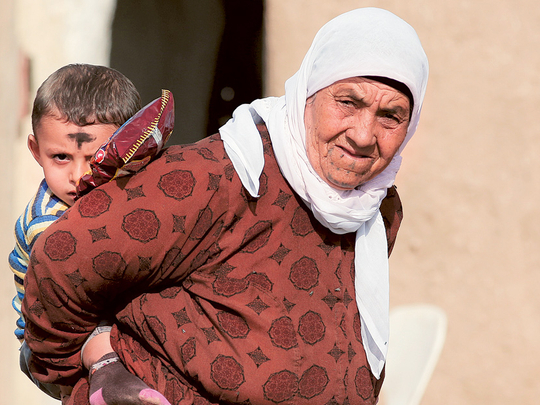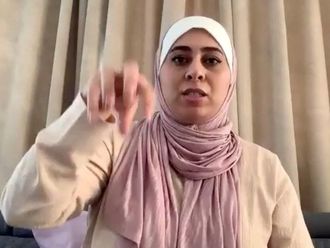
Suruc, Turkey: With medical supplies depleted in the war-ravaged north Syrian town of Kobani, Kurdish activist Blesa Omar rushed three comrades wounded in battle against Daesh fighters straight to the border to dispatch them to a Turkish hospital.
He spent the next four hours watching them die, one by one, from what he believes were treatable shrapnel wounds, while Turkish border guards refused to let them through the frontier.
“To me it is clear they died because they waited so long. If they had received help, even up to one hour before their deaths, they could have lived,” said Omar, 34, an ethnic Kurd originally from Iraq who holds Swedish nationality.
“Once the soldiers realised they were dead, they said, ‘Now you can cross with the bodies.’ I cannot forget that. It was total chaos, it was a catastrophe,” he said, choking back tears.
Deaths of wounded fighters held up at the border have become another emotive charge in a litany of Kurdish grievances against Ankara, which Kurds accuse of turning its back on their kin fighting across the frontier against Daesh.
The anger has brought violence to Turkey itself: Turkey’s 15 million-strong Kurdish minority rose up last week in riots in which at least 35 people were killed. On Tuesday, there were reports that Turkish war planes had bombed Kurdish militants for the first time in two years.
Turkey says it has been generous to Kurds, taking in 200,000 refugees from the Kobani area since Daesh fighters launched their offensive four weeks ago.
But as the United Nations warns of a potential massacre in Kobani in full view of Turkish tanks that have done nothing to help protect the town, Kurdish anger threatens to unravel a peace process to end a decades-long insurgency in Turkey itself.
Kurds who have fled Daesh attacks for shelter in Turkey say they have faced intimidation, including arbitrary detentions last week.
Doctors, parliamentarians, ambulance drivers, security guards, lawyers and activists say between seven and 13 wounded Kurdish fighters died after being kept for hours at the Mursitpinar border gate last week during the worst fighting.
Several bled to death, including from bullet wounds to limbs that would have been survivable with treatment, doctors said.
“We have had trouble at the border gate and several people were not brought to the hospital in time, due to avoidable obstacles. Due to these delays, 12 people lost their lives, all in the last week to 10 days,” Ebrahim Ayhan, a lawmaker in Turkey’s pro-Kurdish People’s Democratic Party, said on Oct. 12.
Authorities cited a variety of reasons for delays lasting five or more hours, like security risks or a lack of permission, Ayhan said. He helped negotiate new procedures with the governor; no one has died waiting at Mursitpinar since Oct. 11.
A spokesman for the governor did not respond to phone calls.
The Health Ministry did not respond to written questions.
Some 70 doctors from Turkey and Europe have descended on Suruc to help treat the wounded. Adnan Amir, an endocrinologist from Stuttgart born in Syria, said he saw 10 deaths, including civilians, caused by border delays on Oct. 9 and 10.
“Most of the cases I saw were at hospital, where people bled to death. On one occasion I travelled in an ambulance to the border and witnessed a case in which a bullet wound in the leg had caused haemorrhaging and death,” Amir said.
Another doctor at Suruc said he saw a total of 13 dead fighters whose passage to hospital had been hampered, including five on the night of Oct. 8.
“Patients not being allowed across the border was our biggest challenge. They would arbitrarily be blocked. We would face insults when we went to collect them,” said the doctor, who added that the situation had improved in recent days.
Despite the delays, dozens of fighters have been treated at the overstretched hospital in Suruc near the border and in other cities. Turkey bristles at the suggestion it is doing nothing.
Turkish authorities say inundated health workers have cared for 600 or more refugees from among the 200,000 that fled since Sept. 19.
The Turkish relief agency AFAD said on Monday it has spent 23 million lira ($10 million) on food, medicine, tents and other humanitarian aid for those from Kobani fleeing the Daesh, which espouses a rigidly conservative brand of Islam.
Nevertheless, Turkey has refused to join the US-led coalition fighting against Daesh, saying it must also confront Syrian President Bashar al-Assad.
The government views Syrian Kurds with suspicion because of their close ties with the Kurdistan Workers Party (PKK), deemed a terrorist group by Turkey, the United States and Europe for its 30-year armed campaign for self-rule in Turkey. An estimated 200 PKK rebels are fighting in Kobani alongside Syrian Kurds.
Syrian journalist Perwer Mohammed Ali was among more than 250 civilians, including women and children, who were detained without charge late on Oct. 5 after the Syrian Kurds’ main political group, the Democratic Union Party (PYD), ordered the last of the civilians to evacuate Kobani amid heavy clashes.
Most were released early on Tuesday after Ayhan and other lawmakers joined the refugees in a show of protest, but Ali and about 100 others remained at the basketball court of a rundown sports complex on the dusty outskirts of Suruc, he said by telephone. He hoped to be freed later in the day.
“While I’m glad to see the release of some of the detainees, we still have ongoing concerns about the arbitrary detention.
That is a human rights abuse,” said Emma Sinclair-Webb of Human Rights Watch, who was denied a visit to the detainees.
An Interior Ministry spokesman declined to comment because he did not have information about the detentions. Police at the facility turned back visitors and did not answer questions.
Lawmaker Ayhan was present when the Syrians were collected at the border, describing the confinement as “a kind of concentration camp to punish” Kurds for last week’s riots.
Ali said he would return to Kobani upon his release, even as Daesh continues its assault on the town.
“Inside or out, it is a bad life. After this, you think it is better to be in Kobani than to be a Kurdish refugee here.”











